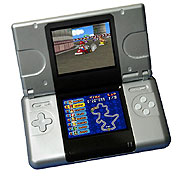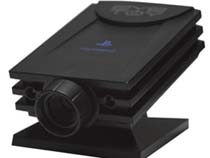
NEW YORK (CNN/Money) – Nintendo's president doesn't mince words: The gaming industry, he believes, is in the midst of a crisis of innovation, which could lead to its demise.
Satoru Iwata has reason to say that, of course. His company recently announced a new handheld that defies gaming conventional wisdom. And while the Nintendo DS received a warm welcome at E3 (the just-completed tradeshow of the video game industry), the company still has to convince consumers that different is better.
 |
|
| Nintendo's latest handheld |
"If we continue down the same path as we have in the past, people may become tired of gaming," Iwata told me at E3.
The DS features two screens, one of which can act as a touch screen, which is incorporated into games. For example, Sega had a Sonic title on display at the show, where Sonic's rate of speed was dependent upon how fast you could move the stylus (or your finger) back and forth across the bottom screen. A Mario, Metroid and Pac Man game were also on display.
The system, which will be renamed before its launch later this year, will also feature an onboard microphone that will allow you to control certain games with only voice commands.
Making those changes, Iwata feels, is the only way to keep people from getting bored.
"We have learned that people get tired of any entertainment form," he said. "In Japan, the gaming market is shrinking. There is still room to expand in the U.S. and Europe. But we should not become complacent with that growth."
It's certainly possible that people will become bored with today's video games. While there were some very promising titles on display at this year's show, there were very few games that were truly unique. Most, instead, rehashed familiar genres, tossing in a few new elements or simply polishing gameplay.
Still not convinced? Consider this: Older gamers have fond memories of games like "Tetris," "Space Invaders" and "Pong." But when Electronic Gaming Monthly magazine put them in the hands of a group of 10-13 year olds last year, the results weren't pretty. Rather than seeing the games' charms, the kids were bored – and mocked the titles mercilessly.
Change through evolution is one thing. Forced change is another. And the rather radical shift in gameplay the DS is promoting is bound to meet with some resistance. That's why Nintendo opted to make the handheld backward compatible with existing Game Boy titles.
"We understand that people tend to be conservative when it comes to entertainment," said Iwata. "So for Nintendo to be secure, we must cater to the minds of the conservative players and those who admire something different."
Of course, one of the most prominent differences in console gaming in the last few years has been the addition of online play – something Nintendo has not embraced at all.
The DS will rectify that to a point. It will come equipped with WiFi technology, allowing it to connect to wireless networks and letting players compete nationwide.
Iwata noted that although it has not been particularly active in online gaming this generation, the company has explored the field before.
 |
|
| Sony's EyeToy was an unexpected hit. |
"Nintendo was the first company that tried to connect gaming with online [with the Nintendo Entertainment System]," he said. "Because we were first to try online content, Nintendo was aware how difficult it was to make online a lucrative business. The reason why Nintendo is basically against the current business model of online is because it asks the subscribers to pay a subscription fee. ... [However,] we are eager to incorporate online technology into our gaming."
(In fairness, not every console charges a subscription fee. While Microsoft (MSFT: Research, Estimates) requires an annual charge for Xbox Live, Sony (SNE: Research, Estimates) does not ask PS2 owners to pay to play online.)
Nintendo's not alone in making radical changes to gameplay. Sony, for example, had enormous success with its EyeToy peripheral, which allowed players to interact with games via a small camera. The idea proved so popular that many observers expect EyeToy gameplay to be an integral part of PlayStation 3.

| |
|
More gaming news and commentary? Click Mario!
|
|
And Konami's (KNM: Research, Estimates) "Dance Dance Revolution," which U.S. officials strongly resisted bringing over from Japan, has proven to be a lasting change to gameplay. New karaoke games, meanwhile, which award points based on your singing abilities, are gaining a notable following.
"The game has changed," said Iwata, "and the way the game is played has to be changed."

Morris is Director of Content Development for CNN/Money. Click here to send him an email.
|

